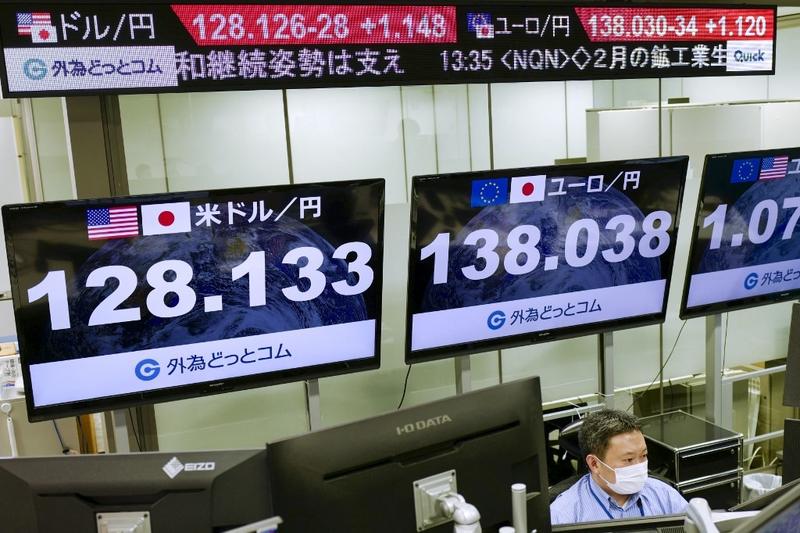 An electronic quotation boards display the foreign exchange rates, including the yen's rate against the US dollar (left) and the euro (center), at a foreign exchange brokerage in Tokyo on April 19, 2022. (KAZUHIRO NOGI / AFP)
An electronic quotation boards display the foreign exchange rates, including the yen's rate against the US dollar (left) and the euro (center), at a foreign exchange brokerage in Tokyo on April 19, 2022. (KAZUHIRO NOGI / AFP)
TOKYO - The Japanese yen plunged to a new 20-year low against the US dollar around the upper-127 zone on Tuesday as concerns continue following another rise in US Treasury yields about a widening gap in interest rates between Japan and the United States.
The euro, meanwhile, fetched 1.0767-0771 dollars and 137.52-62 yen against 1.0776-0786 dollars and 136.87-97 yen in New York and 1.0790-0792 dollars and 136.64-68 yen in late afternoon trade in Tokyo
The dollar was quoted at 127.72-77 yen at noon local time compared with 126.93-127.03 yen in New York and 126.63-65 yen at 5 pm on Monday in Tokyo.
The euro, meanwhile, fetched 1.0767-0771 dollars and 137.52-62 yen against 1.0776-0786 dollars and 136.87-97 yen in New York and 1.0790-0792 dollars and 136.64-68 yen in late afternoon trade in Tokyo.
The dollar's appreciation against the yen in the morning accelerated to the upper 127 yen range, marking its highest level since ay 2002, triggered by the 10-year US Treasury bond climbing overnight to its highest level since December 2018.
Market strategists here said that investors pulled into the US dollar following comments made by Federal Reserve Bank of St. Louis President James Bullard the previous day, suggesting that a 3.5 percent interest rate by the end of the year to combat inflation would be desirable.
ALSO READ: Japan boosts defense of benchmark yield
"His hawkish remarks further cemented views that the US central bank may become more aggressive in its fight against inflation," Yuji Saito, head of the foreign exchange department at Credit Agricole Corporate & Investment Bank in Tokyo, was quoted as saying.
Bank of Japan (BOJ) Governor Haruhiko Kuroda, meanwhile, said on Monday that recent sharp declines of the Japanese yen could negatively impact Japanese firms' earnings outlooks and the nation's already struggling economy.
"The yen's recent depreciation against the US dollar has been quite rapid," Kuroda told a parliamentary session.
Bank of Japan Governor Haruhiko Kuroda, meanwhile, said on Monday that recent sharp declines of the Japanese yen could negatively impact Japanese firms' earnings outlooks and the nation's already struggling economy
The BOJ chief said that it is more desirable that currencies move stably reflecting economic fundamentals, with his assessment of recent volatility in the currency markets amid growing concerns over the impact this could have on Japan's fragile economy.
The sudden depreciation of the Japanese currency also caused Japan's Finance Minister Shunichi Suzuki to say at the session that "bad" would be a proper word to describe the yen's recent depreciation.
Typically, Japanese mainstay exporter firms cheer a weaker yen as it enhances price competitiveness in overseas markets and can see profits augmented when repatriated on favorable exchange rates.
READ MORE: BOJ makes rare 2nd offer to buy unlimited bonds
However, a recent surge in prices of energy and commodities that resource-poor Japan has to import is hurting companies' balance sheets due to the yen's weakness, which is weighing on consumer spending, market analysts said.



